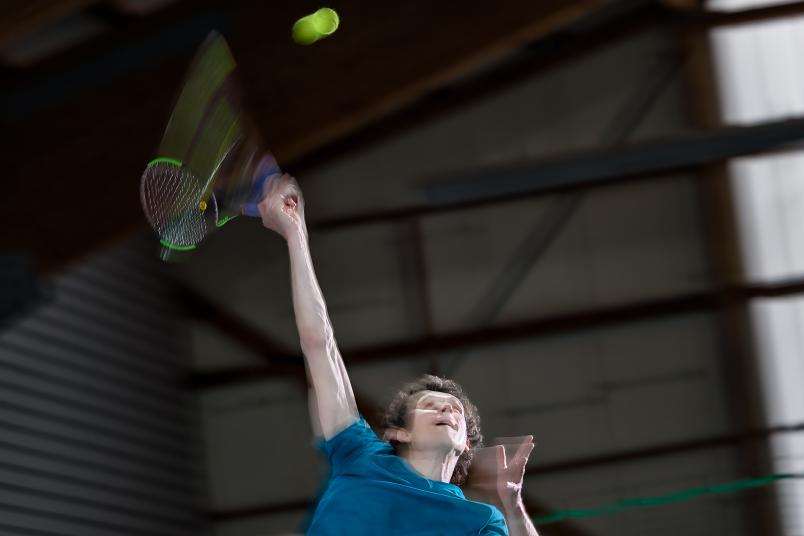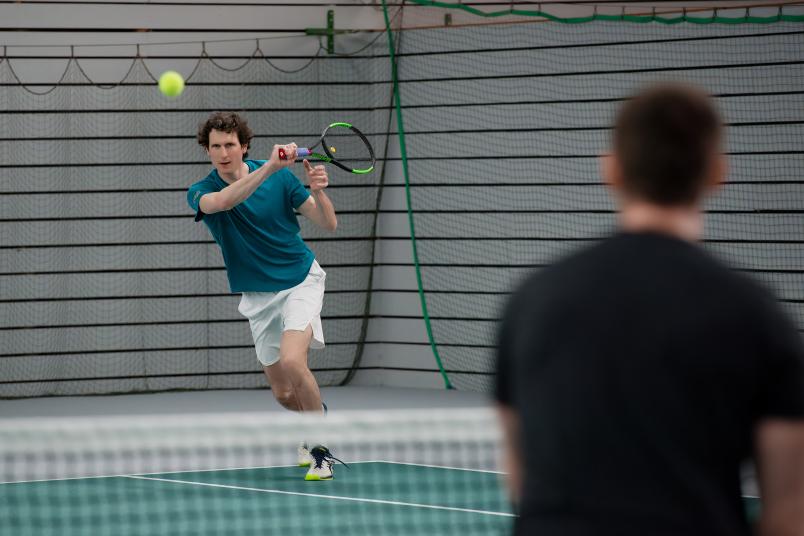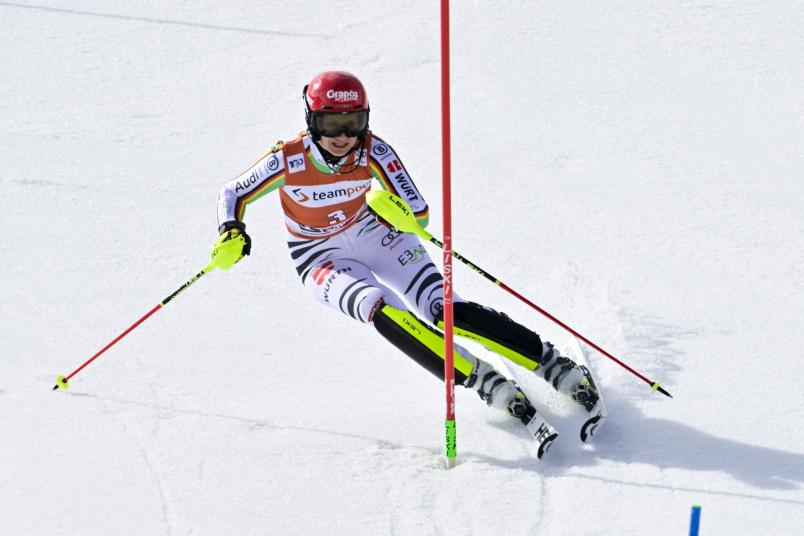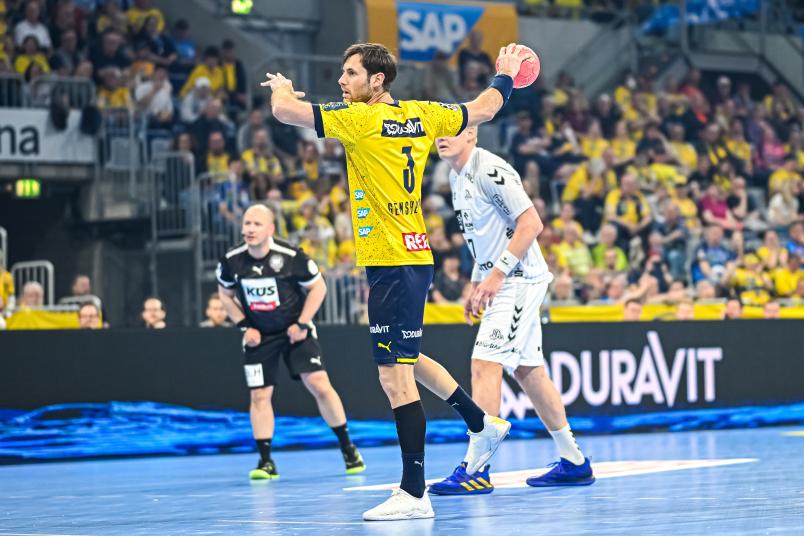
Sport Science
Nerves of Steel or Arm of Iron
When the stakes are high, many athletes find that their mind is playing a trick on them. Still, not all of them do.
Match point. Just one more point to win. The audience is watching with bated breath. You can hear the pin drop: The only sound is the creaking of the ashes under the players’ shoes. One player tightens their grip on the handle of their racket and bounces the ball a few times as it gleams yellow in the sunlight. They gather momentum to raise their arm to serve. Just like they did countless times before in this match. But this time something is off. Their arm is too heavy. It refuses to follow through with the stroke that felt so fluid during the previous serves. It does, in fact, feel like it’s made of iron.
Professor Christoph Bühren from Ruhr University Bochum is familiar with this phenomenon. Having played in the national tennis league for five years, one of his research interests is performance under pressure in professional sports. When a soccer player misses the decisive penalty shortly before the final whistle, a biathlete’s arms start shaking at the shooting range in front of a home crowd or a tennis player hits the crucial serve into the net – that’s when the pros have fallen victim to their mind playing tricks on them.

Choking under pressure is the technical term for this. Christoph Bühren and his colleagues have studied it for a number of different sports. Originally an economist with a focus on behavioral economics, his professorship in Bochum is based at the Faculty of Sport Science. Bühren has been drawing on data from the world of sport for many years. As the competitions follow clear rules and the participants have very high incentives to win, sporting events offer ideal conditions that are pretty much impossible to simulate in the lab.
Home advantage or home disadvantage?
Christoph Bühren wanted to learn more about what happens when a game reaches crunch time – in other words, the decisive phase. He was interested in which performance parameters suffer under pressure and which do not. “Pressure can be a good thing, after all,” he says. “Athletes can rise to new heights when they are cheered on by an enthusiastic crowd.” The researcher had the opportunity to investigate whether a home crowd has a paralyzing or inspiring effect during the coronavirus pandemic, when clubs were temporarily forced to play matches without fans. Still employed at Clausthal University of Technology at the time, Bühren and his colleague Dominic Jung compared the statistics of home teams in the first Bundesliga for matches with and without a crowd.

Skill suffers under pressure.
Christoph Bühren
“There was no doubt about a home advantage for matches where fans were present,” says Christoph Bühren. “The teams performed better in front of a home crowd than during ghost games.” However, the researchers also looked at individual performance measures. Some improved in front of an audience, such as overall running performance and the number of sprints. By contrast, the precision of passes and shots on goal, for example, suffered when fans were in the arena. “When spectators are in the stadium, the home teams fight more ferociously, and that seems to have a significant impact on the outcome of the games,” as Christoph Bühren sums up the findings. “But skill suffers under pressure.”
This is consistent with observations from tennis matches: Players lose their service games at the end of the set, i.e. when the pressure is at its highest, more often than at the beginning of a set. Although it should actually be an advantage to be on serve, many players are less likely to win crucial points than less important points when serving. “However, we’ve seen evidence that this doesn’t apply to the top 50 players in the world,” points out Christoph Bühren. “Particularly good players seem to be able to consider each point in isolation and thus deliver a consistent performance over the entire match.” The problem with studies involving sports such as tennis, however, is that it’s not just one player who decides the outcome. “The fact that there’s an opponent can distort the results,” says the Bochum-based researcher. “It may only appear as if one athlete performs particularly well under pressure, when in fact it’s only because their opponent loses their nerve at crunch time.”
Sports without opponents
Bühren therefore looked at skiing with colleagues from Norway and Switzerland, namely Alex Krumer and Martin Gschwend. The researchers studied data collected in the slalom, giant slalom and super-G of 1,039 women and 1,274 men from 19 seasons. They analyzed the performance separately for the first and second run in the slalom and giant slalom; there is only one run in the super-G.

“In these three disciplines, one of the coaches sets the course,” explains Christoph Bühren. “They can set the gates in a way that suits their athlete’s preferences and give instructions accordingly.” Do the athletes benefit from this approach? Or does the supposed advantage increase the pressure?
Women perform better, men worse
One outcome was observed only in the slalom, but not in the giant slalom or super-G – and only in the second, decisive run. “The slalom is the discipline that requires the highest level of technique,” explains Christoph Bühren. Women perform significantly better in the second run of the slalom if their own coach has set the course. In other words, they exploit the advantage. Men, on the other hand, fail more often under the same conditions; they are eliminated more often in the second slalom run.

Maybe it’s because men’s desire to win is too great.
Christoph Bühren
“This gender effect doesn’t occur in all studies,” points out Christoph Bühren. “But we did find evidence of it three times in our studies.” It was always the men who failed to deliver their maximum performance in the decisive phase of skill tasks. “We believe that this is because men put themselves under pressure in competitive situations,” suspects Christoph Bühren. “Maybe it’s because their desire to win is too great; the level of the stress hormone cortisol rises sharply in competitive situations.” And when the competitive situation puts pressure on them, the athletes overshoot the optimum level.
Less pressure through fewer instructions
According to Christoph Bühren, in skiing it could help to have the course set by a neutral party. Coaches could also adapt their approach. “Particularly with male athletes, you don’t need to motivate them in such situations and, most importantly, you don’t need to point out too many technical details,” advises Christoph Bühren. “If they overthink skill tasks, they may suddenly no longer be able to recall automatisms.”

The researcher would be delighted if the findings from his studies were implemented in practice. Perhaps this could prevent a fall or two in the slalom – and maybe even an “iron arm” or two in tennis.
